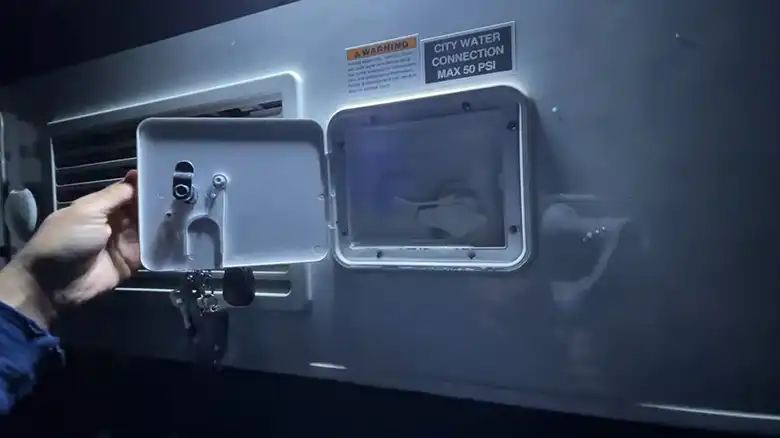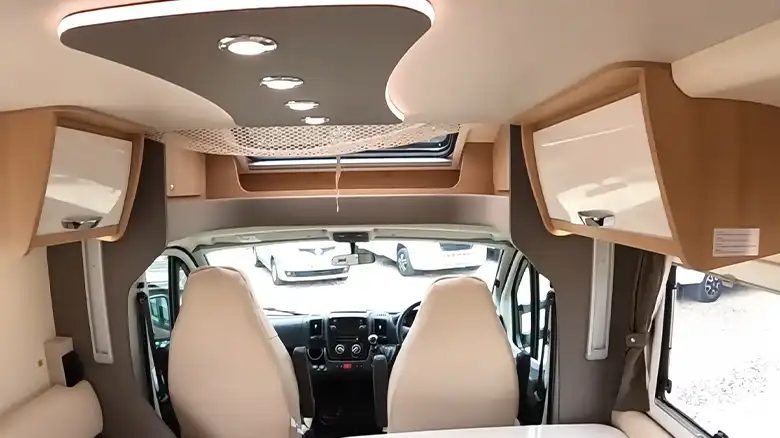The advent of RVing has revolutionized the way people explore the world, offering a unique blend of adventure and comfort. However, the inherent challenge of powering these mobile homes has led to concerns about energy consumption and environmental impact. Here, I’m about to provide a comprehensive overview of factors affecting electricity usage, average consumption figures, practical tips for conservation, and considerations for various RV living scenarios. By understanding and managing electricity usage, RVers can experience the joys of outdoor travel while minimizing their environmental footprint.

Average Daily and Monthly Energy Usage Explained
The electricity needs of an RV depend primarily on its size and appliances/amenities. Standard RVs range from small trailers under 20 feet to large motorhomes over 40 feet. More amenities like multiple air conditioners, electric hot water heaters, and residential refrigerators increase consumption. Climate also affects electricity needs, with RVs requiring more power for cooling and heating in extreme weather.

Source: motorhomeking
On average, RVs consume 5-50 kWh per day. Monthly consumption ranges from 450-1500 kWh for motorhomes and 150-800 kWh for travel trailers. At an average rate of $0.12/kWh, monthly electric bills range from $20-110 for trailers and $60-500+ for large motorhomes with maximum amenities. Here’s a quick review –
Small travel trailer: 150-300 kWh, $20-$40
Mid-sized travel trailer: 300-500 kWh, $40-$70
Large travel trailer/5th wheel: 500-800 kWh, $70-$110
Small motorhome: 450-750 kWh, $60-$100
Large motorhome: 750-1500+ kWh, $100-$500+
The size of an RV and the number of appliances strongly influence electricity needs. The climate also impacts monthly consumption, with more electricity used for air conditioning in hotter regions.
How to Calculate Your RV’s Electricity Costs
Calculating the electricity bill is as simple as plain water. With the following formula, anyone can easily calculate the bill with ease.
1. Estimate average daily kWh usage based on appliances included and typical runtimes.
2. Multiply by the number of days to get the total monthly kWh consumption.
3. Multiply kWh usage by your rate per kWh for the total electric bill.
That means, Daily kWh Use x Days in Month x Electricity Rate = Monthly Electric Bill
For example, an RV using 10 kWh per day for 30 days (10 kWh x 30 days = 300 kWh) at a rate of $0.15/kWh would have a $45 monthly electric bill (300 kWh x $0.15 = $45).
Reference Electricity Usage Table:
| RV Type | Daily kWh | Monthly kWh (30 days) | Monthly Bill (@$0.12/kWh) |
| Small travel trailer | 5-8 | 150-240 | $18-$29 |
| Mid-sized travel trailer | 8-12 | 240-360 | $29-$43 |
| Large travel trailer | 10-15 | 300-450 | $36-$54 |
| Small motorhome | 10-15 | 300-450 | $36-$54 |
| Large motorhome | 15-25+ | 450-750+ | $54-$90+ |
Breaking Down RV Power Expenses
The major electricity draws in an RV are heating/cooling, hot water, refrigerators, cooking appliances, lighting, and electronics. Air conditioning is used the most, especially in hot weather, ranging from 5-15+ kWh daily. The water heater and refrigerator also draw significant power. Reducing the usage of these big appliances provides the best opportunity for conservation. For example, using a fan instead of A/C, taking shorter showers, and minimizing refrigeration can make a big dent.
RV Living Scenarios That Affect Power Consumption
Full-time RVers rely heavily on air conditioning and electricity-hungry appliances. Solar panels and maximum efficiency upgrades are very beneficial. Seasonal RV living involves adapting to changing conditions across travel regions. In cold weather, electricity usage shifts towards indoor heating. Summers bring increased cooling demands. Choosing travel locations with mild climates can help reduce seasonal weather extremes and electricity usage. For off-grid RV boondocking, electricity must be conserved strictly. Limiting the use of unnecessary appliances and utilizing solar power allows for extended stays off the grid.
Efficient Ways to Cut Down RV Energy Costs
RVers can employ various strategies to reduce electricity consumption and extend their time off the grid or minimize their campground electricity bills. Such as –
Install LED Lighting and Energy-Efficient Appliances
Replace traditional incandescent bulbs with energy-efficient LED lights, which consume significantly less power and have a longer lifespan. Consider upgrading appliances like refrigerators, stoves, and water heaters to energy-saving models.
Manage Air Conditioning and Heating Use
Air conditioning and heating are major electricity consumers, so utilize them judiciously. Set thermostats to conservative temperatures and use fans or natural ventilation when possible. Consider installing programmable thermostats to automate temperature control.
Utilize Natural Light and Shading
Maximize natural light by opening curtains and blinds during the day. Install awnings and shades to block direct sunlight, reducing the need for air conditioning.
Turn Off Appliances When Unused
Avoid leaving appliances running unnecessarily. Turn off lights, televisions, and other electronics when not in use. Unplug unused chargers and adapters to eliminate standby power consumption.
Conserve Hot Water Usage
Hot water heating is another significant energy drain. Take shorter showers, use low-flow showerheads, and consider installing an on-demand water heater.
Improve Climate Control Efficiency
Upgrade RV insulation, especially in older models, to minimize heat loss in winter and gain resistance to summer heat. Consider using reflectix covers on windows and skylights to reflect heat away.
Utilize Solar Panels and Generators
Invest in solar panels to generate your own electricity, reducing reliance on campground power. Consider a portable generator as a backup when solar power is insufficient.
Practice Energy-Saving Habits
Encourage energy-efficient habits among fellow RVers. Switch off lights when leaving a room, close doors and windows to prevent air leaks, and use natural ventilation instead of fans whenever possible.
Optimize Battery Usage
Properly maintain and optimize your RV’s batteries to maximize their efficiency and lifespan. Avoid overcharging or discharging batteries excessively.
Choose Energy-Efficient Campgrounds
Select campgrounds with energy-efficient amenities, such as solar-powered lighting and water conservation practices.
Is RV Solar Power Worth the Investment?
Whether or not using solar panels for your RV is cost-efficient depends on several factors, including your RV’s energy needs, your camping habits, and the initial cost of the solar panel system.
Upfront Cost: Solar panel systems for RVs range from a few hundred dollars to several thousand dollars, but they can save money in the long run.
Energy Needs: Solar panels are more cost-effective for RVs with high energy consumption.
Camping Habits: Solar panels are more cost-effective for frequent campers and those with limited electricity access.
Long-Term Savings: Solar panels can eliminate electricity costs, saving you money over time. The average payback period is 5-10 years.
Tax Credits and Rebates: Tax credits and rebates can reduce the upfront cost, making solar panels more affordable.
Overall, using solar panels for an RV can be a cost-effective way to save money on electricity costs, especially if you use a lot of electricity, camp frequently, and camp in areas with limited access to electricity. However, it is important to consider the upfront cost of the system and your own camping habits to determine if solar panels are right for you.
Campground Electricity Fees: What to Expect
In most cases, you will have to pay for electricity at campgrounds and RV parks. The amount you pay will depend on the campground or RV park, your RV’s size and amenities, and your electricity usage. Some campgrounds and RV parks charge a flat rate for electricity, while others charge per kilowatt-hour (kWh). Here’s some quick information on electricity charges at most campgrounds and RV parks –
Small travel trailers: $0.50-$1.00 per kWh
Mid-sized travel trailers: $0.75-$1.50 per kWh
Large travel trailers: $1.00-$2.00 per kWh
Small motorhomes: $1.25-$2.00 per kWh
Large motorhomes: $1.50-$3.00 per kWh
NOTE:
- Some campgrounds and RV parks also charge a connection fee, which is typically a one-time charge of $10-$20. It’s always better to ask the authority before using it.
- Use electricity during off-peak hours. Many campgrounds and RV parks offer discounted rates for electricity during off-peak hours, which is typically late at night and early in the morning.
- Use energy-efficient appliances. LED lighting, energy-efficient refrigerators, and other energy-efficient appliances can help you save money on electricity.
- Conserve electricity. Turn off lights and appliances when you’re not using them and take shorter showers.
Final Thoughts
Navigating the world of RV electricity requires a holistic approach that considers both energy efficiency and environmental responsibility. By implementing conservation strategies, utilizing renewable energy sources, and adopting eco-friendly practices, RVers can minimize their impact on the environment while enjoying the comforts of home on the road. As technology advances and environmental consciousness deepens, the future of RV electricity holds promise for sustainable and eco-friendly alternatives, empowering RVers to explore the world with a lighter footprint.


